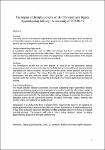The impact of disruptive events on built environment degree apprenticeship delivery – a case study of COVID-19
| dc.contributor.author | Oloke, D | |
| dc.contributor.author | Gyoh, L | |
| dc.contributor.author | Daniel, E | |
| dc.contributor.author | Oladinrin, O | |
| dc.contributor.author | Abdallah, N | |
| dc.date.accessioned | 2023-06-28T14:30:26Z | |
| dc.date.available | 2023-06-28T14:30:26Z | |
| dc.date.issued | 2023-01-01 | |
| dc.identifier.issn | 2398-4708 | |
| dc.identifier.uri | https://pearl.plymouth.ac.uk/handle/10026.1/21008 | |
| dc.description.abstract |
Purpose This study aims to understand the impact of the Covid-19 pandemic disruptive event on delivery of the built environment degree apprentice programme in higher education in the UK and identify the key strategies to minimise the effect. Design/methodology/approach A qualitative approach was used to collect and analyse data from a sample set of built environment degree apprenticeship stakeholders. Semi-structured interviews were conducted with 17 key stakeholders to collate emerging themes on their perceptions of the impacts of the pandemic and strategies to adopted to minimise it. Findings The investigation reveals that the core impacts of Covid-19 on the apprentices training programme are lack of access to the site, furlough, limited access to off the job training, limited interaction with tutors and peers, too much time on the screen, limited pastoral care and lack of contact with a mentor. The census from the research participants is that despite the development and gain with the various virtual platform used during pandemic physical meetings with their mentor remain pivotal to the built environment apprentices learning and training. Practical implications The results provide relevant stakeholders and actors supporting degree apprentices training programmes (training providers and employers, among others) with the information needed to improve the delivery of built environment degree apprenticeship training programmes during a disruptive event Covid-19. The study identifies various strategies to minimise the impact of disruptive events on the apprentices training, including technology, regular meeting with mentors online, and personal and pastoral care. Originality/value The study is the first to document the impact of the Covid-19 pandemic on degree apprenticeship programs in the built environment. This study provides an in-depth understanding of how these programs have been affected and offers potential solutions to reduce or mitigate potential damage. The research will inform future policy decisions related to degree apprenticeship programs in the built environment. | |
| dc.language | en | |
| dc.publisher | Emerald | |
| dc.subject | 33 Built Environment and Design | |
| dc.subject | 3302 Building | |
| dc.subject | Generic health relevance | |
| dc.subject | 4 Quality Education | |
| dc.title | The impact of disruptive events on built environment degree apprenticeship delivery – a case study of COVID-19 | |
| dc.type | journal-article | |
| dc.type | Journal Article | |
| plymouth.issue | ahead-of-print | |
| plymouth.volume | ahead-of-print | |
| plymouth.publication-status | Published online | |
| plymouth.journal | International Journal of Building Pathology and Adaptation | |
| dc.identifier.doi | 10.1108/IJBPA-09-2022-0147 | |
| plymouth.organisational-group | |Plymouth | |
| plymouth.organisational-group | |Plymouth|Faculty of Arts, Humanities and Business | |
| plymouth.organisational-group | |Plymouth|Faculty of Arts, Humanities and Business|School of Art, Design and Architecture | |
| plymouth.organisational-group | |Plymouth|REF 2021 Researchers by UoA | |
| plymouth.organisational-group | |Plymouth|Users by role | |
| plymouth.organisational-group | |Plymouth|Users by role|Academics | |
| plymouth.organisational-group | |Plymouth|REF 2021 Researchers by UoA|UoA13 Architecture, Built Environment and Planning | |
| dcterms.dateAccepted | 2023-06-05 | |
| dc.date.updated | 2023-06-28T14:30:26Z | |
| dc.rights.embargodate | 2023-6-30 | |
| rioxxterms.versionofrecord | 10.1108/IJBPA-09-2022-0147 |


